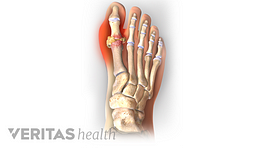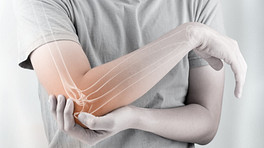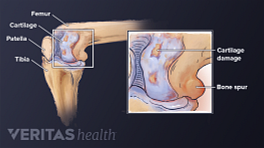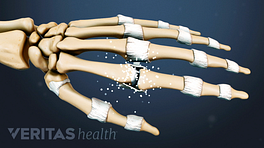Severe knee pain sometimes occurs in absence of a trauma, such as an accident or fall. The pain may develop suddenly or gradually, and it may be accompanied by redness and swelling.
This article discusses several possible causes of severe knee pain. In general, people with severe knee pain are advised to seek medical care, particularly if the pain is accompanied by a fever or other flu-like symptoms.
In This Article:
- Possible Causes of Severe Knee Pain
- How Infection Can Lead to Severe Knee Pain
- Causes of Knee Pain Video
Gout
Gout can cause extreme pain, joint swelling, warmth, and redness. These symptoms can appear suddenly and without warning, often in the middle of the night. About half of all gout cases affect the big toe joint (metatarsophalangeal joint), but other cases affect the knee or another joint. 1 Schmitt, S. Acute Infectious Arthritis. MSD Manuals. Updated May 2017.
See Gout Symptoms
Gout symptoms result from a build-up of uric acid crystals (monosodium urate crystals) in a joint. These needle-like, microscopic crystals collect in the soft tissue of the joint, causing pain that can be excruciating, as well as swelling, redness, and warmth.
See All About Gout - Symptoms, Diagnosis, Treatment
Pseudogout: Calcium Pyrophosphate Deposition (CPPD)
Like gout, pseudogout is caused by a build-up of microscopic crystals in a joint and can lead to sudden, severe joint pain, swelling, warmth, and redness. Pseudogout is less common than gout but more likely to affect the knee joint. 1 Schmitt, S. Acute Infectious Arthritis. MSD Manuals. Updated May 2017.
The microscopic crystals that cause pseudogout are called calcium pyrophosphate crystals. Doctors often refer to pseudogout as calcium pyrophosphate deposition (CPPD) or acute calcium pyrophosphate crystal arthritis (acute CPP crystal arthritis).
Knee Arthritis (Non-infectious Types)
Many types of arthritis can cause severe knee pain, including knee osteoarthritis and rheumatoid arthritis:
- Knee osteoarthritis is the most common form of arthritis and tends to worsen with age. Knee pain usually appears gradually, worsening over months or years. Osteoarthritis is less likely to cause redness and swelling than gout, pseudogout, or an infection.
- Rheumatoid arthritis (RA) is a type of autoimmune disorder that usually affects joints in the hands and wrists first. However, symptoms can also first appear in the knees, ankles or other joints. RA can cause a knee to feel painful, swollen and stiff. The skin over the knee may look red and feel “spongy” when pressed. Symptoms are often worst in the morning.
Many other less common types of arthritis can also cause severe knee pain, such as psoriatic arthritis.
Osteonecrosis (Avascular Necrosis) of the Knee
Osteonecrosis is a condition in which bone tissue dies due to a lack of adequate blood supply. People typically notice severe pain on the inside of the knee with tenderness and joint swelling as well as pain when bending or straightening the knee. These symptoms may cause a person to limp when walking.
Osteonecrosis in the knee is not common. It is most likely to occur after an injury, but it can also develop gradually in absence of a trauma. Older women who have osteoporosis are at the greatest risk for osteonecrosis.
Tumor in the Knee
A tumor at the knee joint is rare. Typically, a tumor will develop slowly, causing intermittent and eventually constant pain accompanied by joint swelling. Pain may be more notable at nighttime, causing an awakening from sleep.
Other Possible Causes of Severe Knee Pain
In addition to the conditions listed above, severe knee pain can be related to an infection—either an infection in the knee joint or a systemic infection, such as the flu, that causes an auto-immune reaction that leads to knee pain. Knee pain related to infection is discussed on the next page.
Other possible causes of severe knee pain in the absence of trauma include soft tissue injuries that can develop over time, such as severe tendinopathy and IT band syndrome. In these cases, knee pain often develops gradually, and knee pain is less likely to be accompanied by localized redness, swelling, and warmth.
- 1 Schmitt, S. Acute Infectious Arthritis. MSD Manuals. Updated May 2017.











